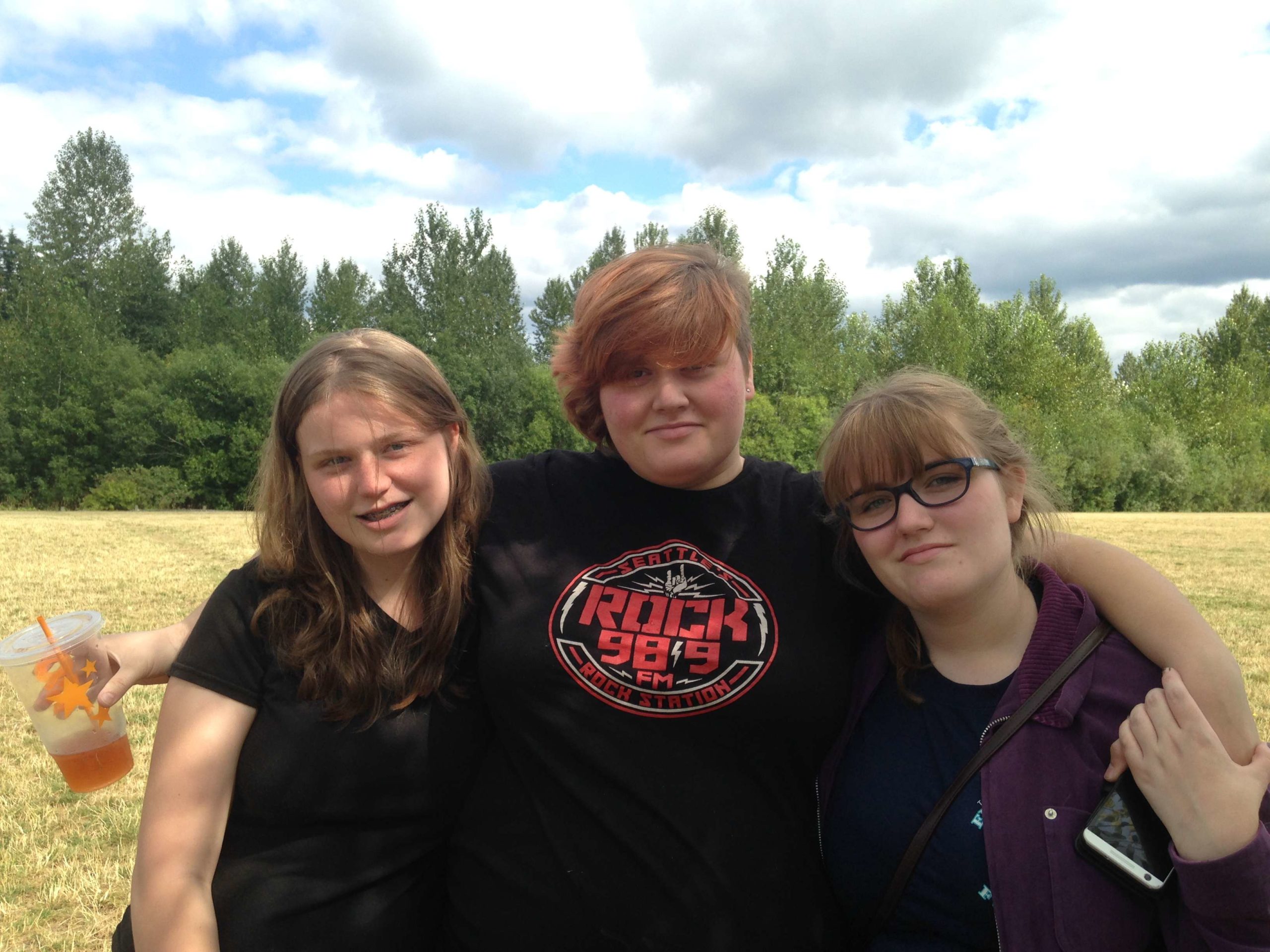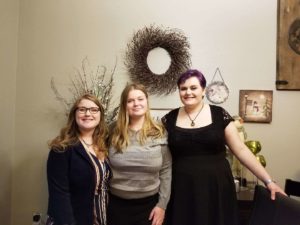Two Sisters Are Able to Attend College Thanks to Their Life-Saving Kidney Transplants
 March 1, 2019 — March is National Kidney Month, which is a month-long, awareness-raising grassroots effort to spread the word nationwide about the importance of kidney health. A Pacific Northwest transplant family knows all too well the life-saving difference healthy kidneys can make.
March 1, 2019 — March is National Kidney Month, which is a month-long, awareness-raising grassroots effort to spread the word nationwide about the importance of kidney health. A Pacific Northwest transplant family knows all too well the life-saving difference healthy kidneys can make.
The Blankenship family of Puyallup, Washington, assumed the role of transplant family with very little warning. Theirs is the type of story that strikes fear in parents’ hearts. Jennifer and Robert were thrilled to meet their first daughter, Sydney, and were excited to continue to expand their family when daughter Allison (Allie) arrived next — quickly followed by Katherine (Katie) the next year. They felt blessed to be raising a trio of talented daughters and lovingly stepped into their family of five whirlwind.
But their lives literally turned upside down in the spring of 2005 when then six-year-old Allie was diagnosed with moderate to severe kidney failure. The news struck fear in both Jennifer and Robert and the family’s ‘new’ normal became something unexpected. Jennifer recently looked back and wrote a first-person narrative of the family’s transplant journey to date and some of her thoughts are shared here:
When our middle daughter, Allison, was in Kindergarten she was diagnosed with Chronic Kidney Disease. We always thought she was just quiet and preferred sedentary activity. But we were blown away that in reality she was experiencing organ failure. Allison was so young at the time. She really did not understand much of what was going on except that she was going to have to get regular shots and blood draws. Her sweet response to that news was, ‘I guess, I’m going to need a lot of Band-Aids.’ Her sisters, Katie (then age 4) and Sydney (then age 8) did not understand what was happening. They were scared but were always trying to help.
The threat of losing a child to a disease is gut-wrenchingly painful. It is as if you come untethered from the rest of your life. Somehow doctor appointments, lab visits, medical testing and providing comfort to all three of our daughters completely took over our lives. We also started experiencing the financial difficulties that are connected to organ failure. We were terrified. Our biggest question at the time was, “What if we cannot afford to get any of our girls the medical care they need?”
As Allie’s kidney disease progressed, Jennifer and Robert started meeting with the transplant team at Seattle Children’s Hospital. In late October 2007, upon a transplant social worker’s urging, Jennifer called the Children’s Organ Transplant Association (COTA) to learn more about fundraising for transplant-related expenses. COTA uniquely understands that parents who care for a child or young adult before, during and after a life-saving transplant have enough to deal with, so COTA’s model shifts the responsibility for fundraising to a community team of trained volunteers. COTA is a 501(c)3 charity so all contributions to COTA are tax deductible to the fullest extent of the law, and funds are available for a lifetime of transplant-related expenses. On November 1st the Blankenship’s became part of the COTA Family.
Our friends and family rallied around us, working with COTA to plan fundraisers that would help alleviate our financial fears so we could focus on caring for our daughters. Allison became frail and weak and her physical growth slowed. It was quite noticeable. She barely complained as her daily medication intake increased to 42 pills. By the time she turned eight years old, we could wait no longer and her kidney transplant was scheduled with me as her living donor.
In December 2007, Katie and Sydney stayed with our best friends, while I was taken to one hospital and Allison to another. Robert stayed with Allison at Seattle Children’s Hospital waiting for my kidney to be harvested and delivered to her operating room. After the transplant Robert and Allison remained at Children’s for almost two weeks. Upon Allie’s discharge, Robert returned to work and I stayed home from my job for several weeks to heal and to manage Allison’s extensive post-transplant care.
As Allison recovered and grew stronger, she had to drink a lot of water for her little body. We would encourage her by reminding her that she never had to go on dialysis because she got a transplant and water (lots of water) would keep her new kidney healthy. Even at her young age she understood. Allison grew up drinking lots of water and never complaining when taking her immunosuppressant medications.
 After some time, the Blankenship family returned to their busy routines and the three sisters all experienced full childhoods. Jennifer was simply happy to embrace ‘busy’ and to live a somewhat normal life with one daughter who was post kidney transplant. However almost a decade after Allie’s transplant, a completely unexpected telephone call disrupted the Blankenship family’s ‘new’ normal once again
After some time, the Blankenship family returned to their busy routines and the three sisters all experienced full childhoods. Jennifer was simply happy to embrace ‘busy’ and to live a somewhat normal life with one daughter who was post kidney transplant. However almost a decade after Allie’s transplant, a completely unexpected telephone call disrupted the Blankenship family’s ‘new’ normal once again
When we got the call that our youngest daughter, Katherine, needed an appointment to discuss bad renal lab results, we immediately thought they had the wrong daughter. Allison was the one with kidney disease – not Katherine. But after our confusion cleared we took Katie in for further testing. On May 5, 2016, we were told Katie was in End Stage Renal Failure and would likely need to be put on dialysis within a matter of weeks. It was a mixed blessing that we knew what that meant in the long term. Katie’s first questions were: Can I still go to college someday and can I still volunteer at Girl Scout Camp this summer? Katie’s diet was immediately restricted and we started discussing dialysis. Because dialysis had always been what we worked to avoid with Allison, Katie had some serious concerns about what would happen next. Within a week of her diagnosis of kidney failure, Katie was diagnosed with Celiac Disease. The two diets conflicted making her nutrition management a major challenge. There were no arguments from Katie as she adjusted to the diets and medications. She was an expert already having seen her sister go through it all … but the knowledge of what was to come was a mixed blessing.
One bright spot during these difficult days was the reassurance that given COTA’s lifetime commitment, we were able to focus on caring for Katie rather than the fear of how to pay for the mountain of financial challenges ahead.
In March 2017 a COTA representative travelled to Puyallup, Washington, to work with new volunteers and to offer a ‘refresher course’ for those volunteers who had raised funds for COTA in honor of Allison B nearly a decade earlier.
For almost two years, we tried to find Katie a living donor who was able to donate a kidney. While we waited, as happens to most kidney patients, her health further declined rapidly. Before we knew it, Katie was having surgery to prepare for peritoneal dialysis. All through the journey, COTA was there to help us manage the financial end of this hurdle. Katie stopped going to school and spent much of her time sleeping or resting on the couch. She was activated on the deceased donor list as we continued our search and tried to find a possible living kidney donor. Then one day, on the way to Seattle Children’s for our dialysis training, we got the call. There was a kidney available. On September 29, 2017, Katie received her new kidney … and her second chance at life. The gift of life is a miracle our family cherishes every day. We are grateful beyond words to the donor and his/her family.
 Our gratitude also extends to COTA for providing a lifeline through our daughters’ transplant journeys, which has allowed us to focus on the priority of family. Reality continues to throw roadblocks — like job loss and broken down cars. But with COTA we know, whatever comes our way, we will make it through to the other side.
Our gratitude also extends to COTA for providing a lifeline through our daughters’ transplant journeys, which has allowed us to focus on the priority of family. Reality continues to throw roadblocks — like job loss and broken down cars. But with COTA we know, whatever comes our way, we will make it through to the other side.
Today, Allison attends Central Washington University where she is pursuing a degree in music education. She just recently sent her parents a message saying she had made the honor roll. Her hope for the future is to complete college, become a music teacher and be surrounded by good people while living a healthy life. Katie is finishing her senior year and has just applied to the University of Washington with a goal of helping others with her interest in psychology.
According to Jennifer and Robert, “COTA was there as we prepared for Allison’s kidney transplant. COTA helped coordinate a group of friends to raise money for transplant-related expenses. COTA supported our volunteers by answering questions, providing trainings, maintaining financial records and always being encouraging. They gave legitimacy and respectability to the fundraising efforts. COTA provided support for transplant-related medical expenses, which made it possible to keep our home functioning throughout both girls’ transplants. Every dime was accounted for and we were always kept informed. As things returned to normal, COTA kept in touch and helped whenever we needed it. When our second child was diagnosed, COTA was there and ready to help again. COTA has worked hand-in-hand with us through every step of this journey. COTA has proven to be entirely trustworthy, caring, and supportive … for a lifetime!
We are thankful for COTA’s support that has helped us through this journey and made possible for us to focus on our family. We have so much love and appreciation for our friends and family, now including our COTA family, who have helped us along the way. There are simply not adequate words. Kidney failure is a lifelong experience; we have every hope we will weather the storms as they come and be a support to others along the way. We are able to be at peace about finances because we know that COTA will be there for the difficult times, which we know will come. We, like our girls, have learned that life is a gift … and we try to appreciate every moment.

March is designated National Kidney Month to raise awareness about the prevention and early detection of kidney disease. In the United States, kidney diseases are the ninth leading cause of death. More than 30 million Americans have kidney disease, and many do not know it. There are more than 95,000 people waiting for kidney transplants, with close to 600,000 people in the United States suffering with kidney failure. More than 3,000 new patients are added to the kidney waiting list each month; 13 people die each day while waiting for a life-saving kidney transplant. Every 14 minutes someone is added to the kidney transplant list. You can visit www.RegisterMe.org to learn more about registering to be a life-saving organ donor.


